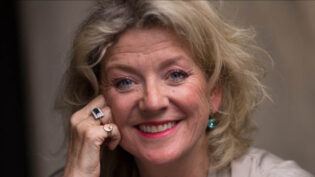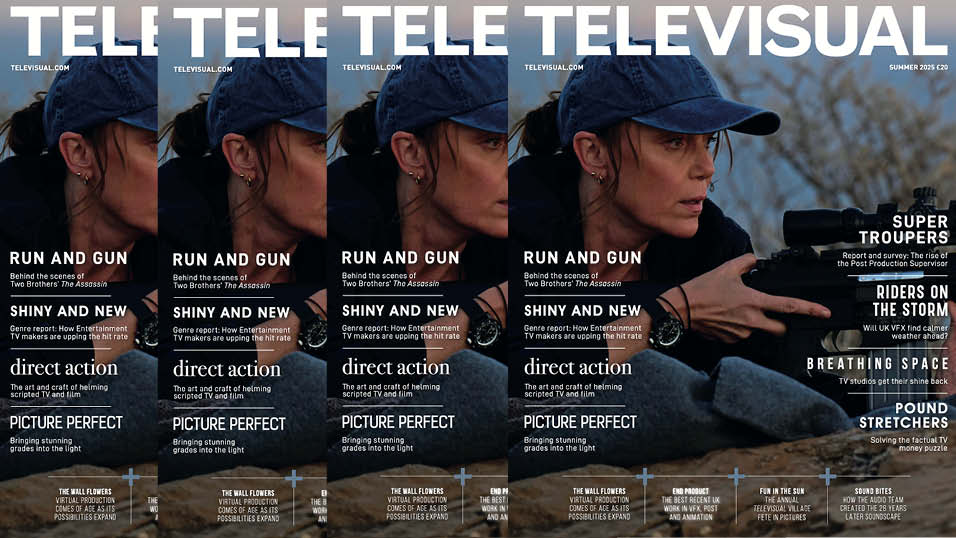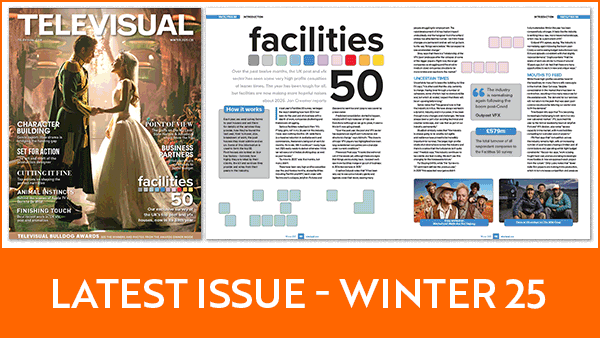Arabella Page Croft, Executive Producer, Black Camel on the making of An t-Eilean (The Island), the UK’s first-high-end Gaelic drama series.

Billed as a “tense, twisting story of lies, loss and long-buried secrets, the murder mystery is set against the elemental backdrop of the Western Isles of Scotland”, An t-Eilean (The Island) combines Gaelic dialogue with English and will air in early 2025 on BBC ALBA, BBC iPlayer and BBC Four.
What made you decide to branch out into non-English language drama?
It felt the most natural thing to partner with BBC ALBA and explore our family crime story in Gaelic and set this drama in a large remote house in the islands of Harris & Lewis.
What drives me at Black Camel and as a creative producer, is to create shows that we can bring to broad global audience. I really believe that in Scotland we have an extraordinary country and I am hugely proud of how skilled we are in our sector in Scotland. We approached An t-Eilean with exactly the same drive and mentality as we do for all our mainstream shows, asking, is it a good story, will the audience be compelled to return? We really want the world to see our work and we created An t-Eilean for both a local, network and global audiences I hope. Our international distributors are now in the market with the show so we will see how it sells!
And why Gaelic?
At Black Camel we always love doing something different and we have a history of making all sorts of things from musicals to horror films, queer content to marine detective shows and kids dramas so I think pivoting is a super skill we have developed to survive and thrive in Scotland. We were all quite excited by the challenge to develop and create a show in Gaelic and felt it was just the right way to explore this particular crime story. The co-writing anchored the piece between Scottish writer Nick Osborne and Gaelic writer Patsi Mackenzie.
Why did you also incorporate English?
We researched this and it was naturalistic for the incoming senior police investigating team to speak English so we leaned into what was authentic and what might happen in the real world, should a crime of this magnitude happen.
How did you decide what proportion of each language you would use in the script?
We aimed for a 70/30% in Gaelic favour and that felt balanced. We spend time with the Gaelic speaking family and the police investigation is about 30% of the show and that was the English part. We trust the audience agrees this feels natural way to how the language is used in real life. I hope everyone feels we did get this right!
How did you choose the location?
Both the creator and writer Nick Osborne and BBC ALBA commissioner Bill Macleod were hugely keen on Amhuinnsuidhe Castle in Harris as the primary location in their heads. It is a phenomenal location but is very remote. When we began scouting, we looked at many big houses but the Series Producer Kieran Parker then also fell in love with Amhuinnsuidhe Castle and he creatively worked out an ingenious way to use it. He thought he could accommodate all the cast in the castle so during the day we used it as the chief location and at night everyone ate and slept there or nearby. It actually made it feasible to film on the islands for five weeks as we couldn’t have achieved bringing the cast and crew in from Stornoway each day with travel time (well over an hour at the beginning and end of the day) and the expense so it really was a clever way to make the show.
How did the cast come together?
Casting is always a nerve-wracking experience and you wonder whether you have cast the show well but every time we make a new show in Scotland I am amazed by the depth and quality of talent we have here so making An t-Eilean was no different. It was a very exciting process.
The key was our hire of brilliant casting directors Simone Pereira Hind and Anna Dawson and our cinematic filmmaker, Tom Sullivan, spoke Irish Gaelic and had directed the award- winning film Arracht in Irish Gaelic but he also is a very experienced actor so understood performance first and foremost. It was really important to me that he had these skills. These key hires understood we were looking for nuanced performances and worked with us to ensure we found the most naturalistic cast.
We had our heart set on Gaelic speaking talents – Sorcha Groundsell for the role of Kat Crichton, the Family Liaison Officer and lead, Iain Macrae for Sir Douglas, Sínead MacInnes as Eilidh and Meredith Brook as Síne, so we were thrilled they committed because they are immensely talented artistes. And as we rounded out the family/ siblings, we cast brand new talent like Andrew Macinnes, who had never acted before – he plays Calum beautifully and Sam James Smith as Ruaraidh, who is also a wonderful talent, who trained at the Conservatoire.
Tom Sullivan, was the right cultural fit as director who also found a depth and balance of performances that unifies the whole show.
What made you choose to cast one of the key characters, with an English actor – Sagar Radia – was that a conscious decision?
Actually we just loved Sagar’s energy in his audition and his spikey take on the character of DCI Ahmed Halim. It wasn’t about being from anywhere, lots of strong and very interesting cast auditioned but we just felt immediately that he was our Halim!
And you chose an American writer and Irish Director for a Gaelic drama? What was your reasoning behind this choice?
Nick is actually Scottish but he lives in the US. Nick and I grew up in big families and when we were exploring ideas this was a theme we continued with and returned to. We explored how well do we know our families (especially as we grow up and away from each other to different parts of the world) and what would happen if siblings had to return to the family home if there is a murder in the family. It has been a very exciting project to develop.
Was it challenging to find actors and TV creatives who work in the Gaelic sphere?
As it turns out Gaelic talent runs deep and we in Scotland (in commissioning and in producing) must continue to create opportunities to bring it to the surface and highlight who is out there.
We had super strong casting directors in Simone Pereira Hind and Anna Dawson (Outlander) who ran an open casting call on social media call ask Do you speak Gaelic, do you like to perform? Casting is one of my favourite parts of the whole show. It’s our job to do the deep work and find out who is out there. Simone and Anna impressed me becuase they were so very driven to make sure we had the very best actors and were open to everyone they saw.
There is exceptional young Gaelic speaking talent that we couldn’t use in this season but and if we get to make a second season of An t-Eilean, we will be telling a young story so we can highlight the new generation and young people who can act!
Was everyone on the production Gaelic speaking?
Our production crew are Scottish based mostly but we did have some Gaelic speakers in the crew, particularly around the camera and with some new talents coming through in different training roles which was funded by Skillset and MG ALBA.
Today’s generation is accustomed to watching content with subtitles, do you think this can be transferred easily to television drama?
Subtitles simply aren’t what they were perceived to be – for obscure, foreign language dramas. Everyone’s tastes have broadened (for me personally since The Killing!) but our teenagers are all glued to subtitles on TikTok too. There’s been a global transition in our appetites since Parasite won the first non-English language win for Best Picture and Squid Gamehitting number 1 in 94 countries. Let’s hope audiences want to now tune into our crime show in Gaelic with subtitles. It’s hugely exciting.
Did your experience creating Float help you make this high-end, quality drama with modest budget? Explain?
Float was actually made with a much smaller budget and crew than An t-Eilean but at Black Camel we are skilled in low budget filmmaking as we come from making ambitious shows like Annika on modest budgets and independent feature films like Sunshine on Leith and Falling for Figaro. The Series Producer realised if he could give the cast and crew the experience of living in a castle in the Hebrides and that was an amazing opportunity for everyone. ‘Come to Amhuinnsuidhe Castle and stay for five weeks’ – that’s how we made the show on the budget. This kept the travel time and budget manageable and meant everyone enjoyed this fabulous shoot in a glorious location and also were accommodated in the same place. We couldn’t have travelled the cast and crew in and out from Stornoway each day – we’d never have made the schedule!t was a brilliant decision that enabled us to give the show the scale we wanted.
Staff Reporter
Share this story















